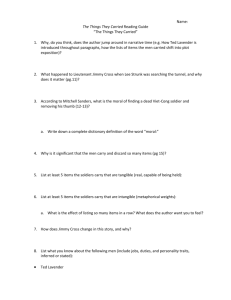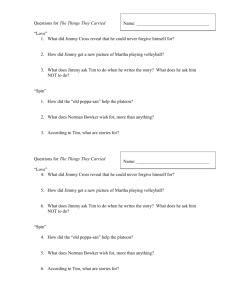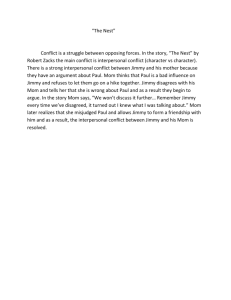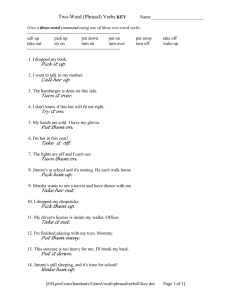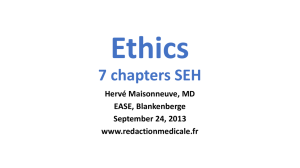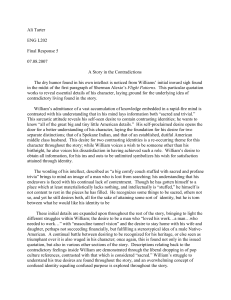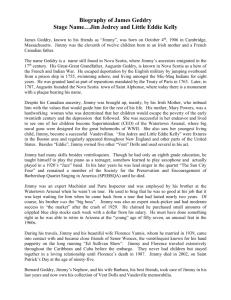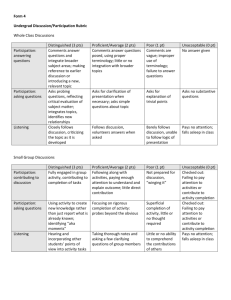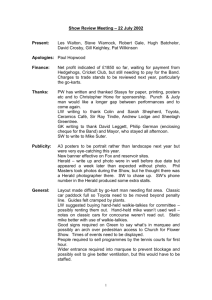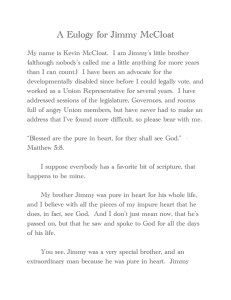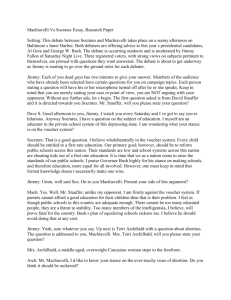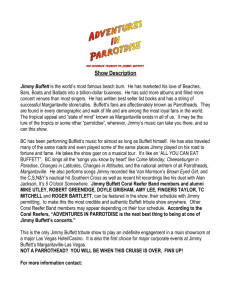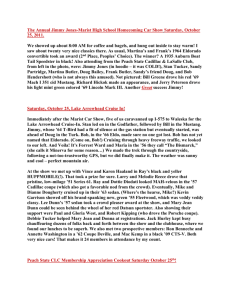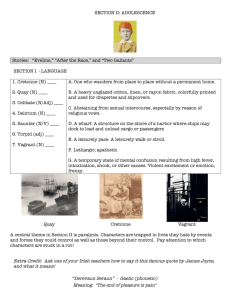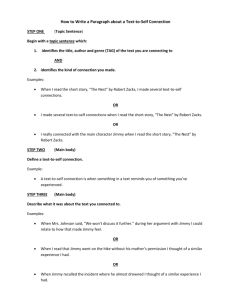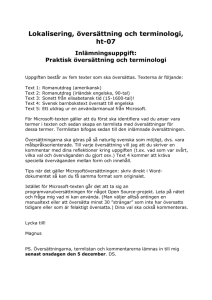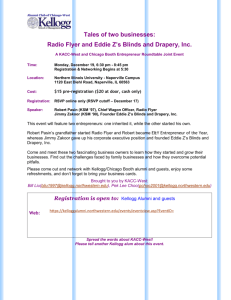Published Monday, November 8, 1999, in the Miami Herald
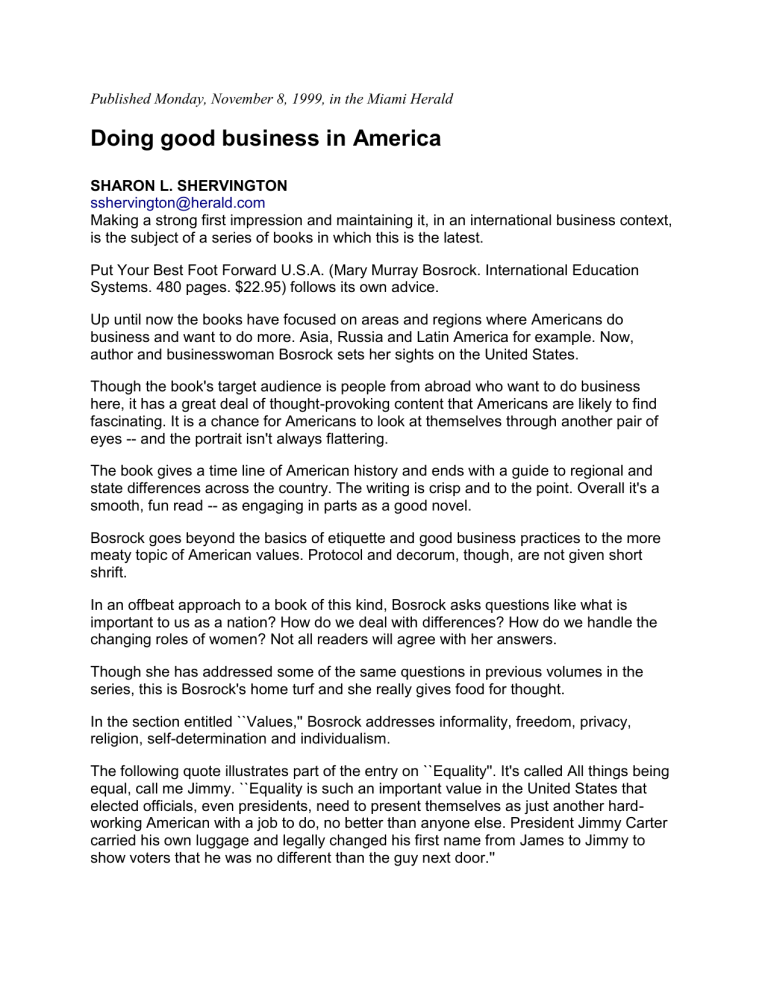
Published Monday, November 8, 1999, in the Miami Herald
Doing good business in America
SHARON L. SHERVINGTON sshervington@herald.com
Making a strong first impression and maintaining it, in an international business context, is the subject of a series of books in which this is the latest.
Put Your Best Foot Forward U.S.A. (Mary Murray Bosrock. International Education
Systems. 480 pages. $22.95) follows its own advice.
Up until now the books have focused on areas and regions where Americans do business and want to do more. Asia, Russia and Latin America for example. Now, author and businesswoman Bosrock sets her sights on the United States.
Though the book's target audience is people from abroad who want to do business here, it has a great deal of thought-provoking content that Americans are likely to find fascinating. It is a chance for Americans to look at themselves through another pair of eyes -- and the portrait isn't always flattering.
The book gives a time line of American history and ends with a guide to regional and state differences across the country. The writing is crisp and to the point. Overall it's a smooth, fun read -- as engaging in parts as a good novel.
Bosrock goes beyond the basics of etiquette and good business practices to the more meaty topic of American values. Protocol and decorum, though, are not given short shrift.
In an offbeat approach to a book of this kind, Bosrock asks questions like what is important to us as a nation? How do we deal with differences? How do we handle the changing roles of women? Not all readers will agree with her answers.
Though she has addressed some of the same questions in previous volumes in the series, this is Bosrock's home turf and she really gives food for thought.
In the section entitled ``Values,'' Bosrock addresses informality, freedom, privacy, religion, self-determination and individualism.
The following quote illustrates part of the entry on ``Equality''. It's called All things being equal, call me Jimmy. ``Equality is such an important value in the United States that elected officials, even presidents, need to present themselves as just another hardworking American with a job to do, no better than anyone else. President Jimmy Carter carried his own luggage and legally changed his first name from James to Jimmy to show voters that he was no different than the guy next door.''
These little vignettes, scattered throughout the book, often with illustrations, are informative, and many are as funny as they are insightful.
One example: This Is My Silverware. ``A friend of mine attended a formal banquet in which many Americans were present. The woman on my left placed her bread on my bread plate and the man on my right drank from my wine glass. I was lucky they did not use my silverware.' ''
Besides offering tips that can help business travelers avoid both faux pas (what do you do when corn is served and it is a food that is only fed to animals in your country?) and major disasters, Bosrock sums up nicely many elements of being American.
She's not above letting loose with a real zinger once in a while, either. She argues when an American asks ``How are you?'' he doesn't necessarily want a full answer. I would argue some people really do expect an honest response. It's more a matter of degree.
People don't want a laundry list of problems, but generally will go out of their way to help someone who asks for it.
Though Bosrock indeed gets an A for effort, the book's time line could use some work.
Some historical aspects seem to get an inordinate amount of space, while meatier issues, like American Indian and black histories, don't get as much clarity or attention as they could.
For example, in the entry on the end of Reconstruction, it reads: ``The goal of
Reconstruction was to expand the legal rights of blacks, but lingering resentment and cultural clashes do not abate.'' While true, the entry fails to note that much of the
``lingering resentment'' was expressed in the form of lynchings and other violence toward blacks.
Still, the fact that at least a look at such important issues is included is heartening.
Simply in terms of being a compendium of proper behavior in business situations as well as social occasions, this offering could not be more exhaustive. What are the proper gifts to bring to a business meeting or to a visit at someone's home? How does one prepare for the business climate before leaving home through the judicious use of phone calls, faxes and letters? And, of course, the art of listening closely and paying attention to clues, both verbal and nonverbal.
If you are planning a business trip abroad, then one of the other books in the series may be your best bet. But if you want to learn more about yourself and your compadres,
Putting Your Best Foot Forward U.S.A. may be the way to go.
